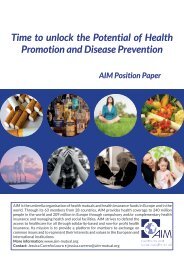Exploring patient participation in reducing health-care-related safety risks
Exploring patient participation in reducing health-care-related safety risks
Exploring patient participation in reducing health-care-related safety risks
You also want an ePaper? Increase the reach of your titles
YUMPU automatically turns print PDFs into web optimized ePapers that Google loves.
Patient <strong>safety</strong>, rights and medication <strong>safety</strong> <strong>in</strong> primary <strong>care</strong> <strong>in</strong> Poland<br />
ChApTER 5.<br />
pATIENT SAFETY, RIGhTS AND<br />
MEDICATION SAFETY IN pRIMARY CARE<br />
IN pOLAND<br />
Basia Kutryba, Jarosław Woroń, Hal<strong>in</strong>a Kutaj-Wąsikowska, Andrzej Warunek<br />
Introduction<br />
Many studies focus on medication <strong>safety</strong> as one of the fundamental areas of <strong>patient</strong><br />
<strong>safety</strong>. Adverse drug events (ADEs) are the most frequent type of adverse events. There<br />
is often confusion, however, between ADEs and adverse drug reactions (ADRs). They<br />
are def<strong>in</strong>ed, respectively, as follows:<br />
» ADE – every adverse event <strong>related</strong> to medic<strong>in</strong>e use (pharmacotherapy); there is not<br />
necessarily a cause–effect relationship <strong>in</strong>volved; and<br />
» ADR – every event has a cause–effect relationship result<strong>in</strong>g from medication use; the<br />
relationship between cause and effect can be determ<strong>in</strong>ed as result<strong>in</strong>g directly from<br />
the medic<strong>in</strong>e use − anaphylactic shock dur<strong>in</strong>g penicill<strong>in</strong> adm<strong>in</strong>istration, for example.<br />
ADEs therefore <strong>in</strong>clude ADRs and other adverse events <strong>related</strong> to medication use,<br />
prescrib<strong>in</strong>g, storage and design.<br />
Several national multicentre studies of adverse events <strong>in</strong> different countries reveal that<br />
between 6.3% and 12.9% of hospitalized <strong>patient</strong>s suffer at least one adverse event dur<strong>in</strong>g<br />
their admissions and that between 10.8% and 38.7% are caused by medic<strong>in</strong>es. Between<br />
30.3% and 47% of these ADEs appear to be consequences of medication errors and may<br />
therefore be considered to be preventable.<br />
Available data show that the morbidity and mortality associated with medication errors<br />
<strong>in</strong> Europe are of a similar magnitude to those <strong>in</strong> the United States and other countries.<br />
The reported <strong>in</strong>cidence of preventable ADEs <strong>in</strong> European hospitals ranges from 0.4%<br />
to 7.3% of all hospitalizations. European evidence on medication errors is presented<br />
<strong>in</strong> the follow<strong>in</strong>g sections <strong>in</strong> the format of the different European studies on ADEs,<br />
but the review of the research literature shows that only a few studies are <strong>related</strong> to<br />
pharmacotherapy and the use of medic<strong>in</strong>es <strong>in</strong> PHC.<br />
These studies reveal that ADEs are mostly caused by errors <strong>in</strong> prescription and drug<br />
adm<strong>in</strong>istration or lack of <strong>patient</strong> compliance and are probably more frequent than <strong>in</strong><br />
hospital sett<strong>in</strong>gs because drug consumption <strong>in</strong> PHC is greater, although data on this are<br />
scarce and fragmented.<br />
The European research on preventable ADEs occurr<strong>in</strong>g <strong>in</strong> primary <strong>care</strong> and lead<strong>in</strong>g to<br />
hospital admissions has shown that between 0.9% and 4.7% of all hospital admissions<br />
77



